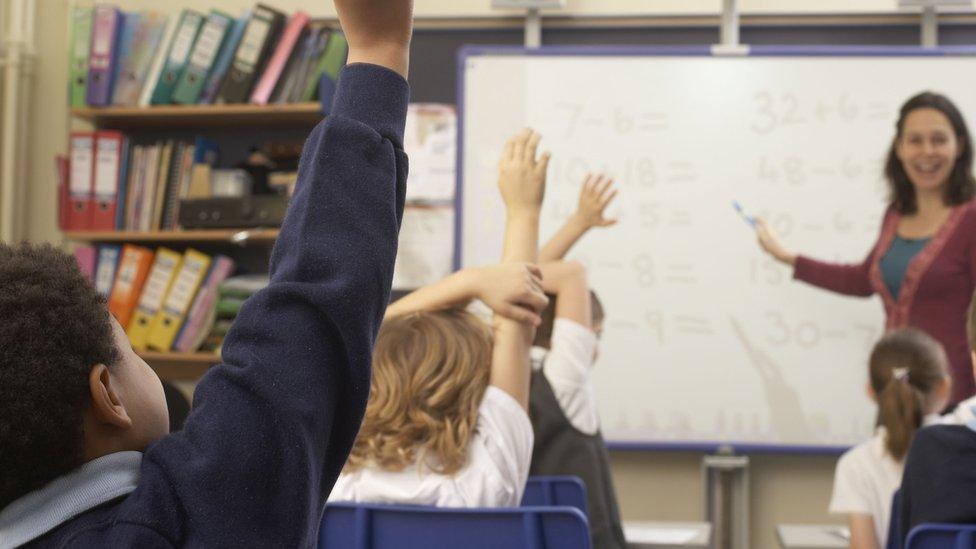£78bn wage hit from pandemic lost learning - study
- Published
- comments

Tutoring - online and face-to-face - has been a key plank of the catch-up plan
Education recovery funding needs to quadruple to at least £13bn to prevent learning lost due to the pandemic from doing lasting damage, a report says.
The Education Policy Institute suggests a minimum of £78bn in lifetime earnings will be lost by children who missed out on education in England.
It argues recovery schemes could be targeted better at the regions and the types of pupils who lost out the most.
The government said its catch-up plans would help millions of pupils by 2024.
It has set up a national tutoring scheme, recruited learning mentors and trainee teachers, and offered some extra money in the pupil premium to support the education of the very poorest pupils.
It said its packages of support were ambitious, effective and long-term.
The institute's report, Education Recovery and Resilience in England,, external says even under its most optimistic scenario, a 1% earning loss per pupil over a lifetime would equate to between £78bn and £154bn.
"Under our pessimistic scenario, that figure rises to £463bn in lost income," it adds.
Its analysis estimates lost lifetime earnings of between £8,0000 and £46,000 per pupil, across the 10 million children in England's education system, depending on the extent of the learning loss.
These figures only relate to salary loss, and do not include any effects on health, wellbeing and engagement with civic society.
"These long-term consequences highlight the need for an urgent and more ambitious recovery package from the government," it says.
"The sheer scale of the potential long-run costs without significant policy action (an absolute minimum of £78bn and potentially into the trillions) provides a rock-solid case for investment in the tens of billions if it can genuinely mitigate lost learning."

Pupils missed months of lesson time
The report adds: "The government's current plans to spend £3.1bn in total pales in comparison to the £10-15bn we estimate is needed over the next three years."
As well as calling for a broader, better-funded programme, it urges a greater focus on more disadvantaged pupils and certain regions of the country.
Previous research from the Education Policy Institute (EPI) suggests that by autumn 2021, all pupils had fallen behind by more than three months, but that poorer pupils had slipped further behind by three to four months.
Regional impact
It also suggests that disadvantaged pupils are catching up at a slower rate than their peers. And it says learning loss has affected some parts of the country, particularly the North East and Yorkshire and the Humber, more than others.
The report also found the North East, North West and the East of England had missed their targets for offering pupils targeted one-to-one and small-group tuition. In the South, a 96% of target was achieved.
EPI wants recovery packages targeted more broadly, with an increased focus on disadvantaged pupils from low income families.
Nick Brook, deputy general secretary of school leaders' union NAHT, said over recent months, virtually every education expert had called on government to take seriously the deep social, economic and educational impact of the pandemic on children.
"Today's report helps quantify the scale of the challenge and the size of the solution required. In determining how much is needed to make good this deficit, the government must see education as an investment in this country's future, not simply a drain on the nation's finances."
Julie McCullough, director of policy heads' union the Association of School and College Leaders, said everyone working in education had warned of the potential consequences of under-investment in our schools and colleges and the knock-on effects for the students impacted by the pandemic.
"The EPI report lays bare the regional disparities we have seen over the last 18 months and crucially exposes the widening gap in education experienced by disadvantaged students in comparison to their more affluent peers."
A Department for Education spokesperson said: "We are significantly expanding the National Tutoring Programme this year, building on the progress from last year when more than 300,000 children benefited, and giving schools more flexibility to deliver tutoring that works for them and their families.
"This investment in education recovery - of over £3 billion to date - comes on top of the £14.4bn this government is investing in schools in total over the three years up to 2022-23, helping young people leave school better educated, better skilled and ready for the world of work."